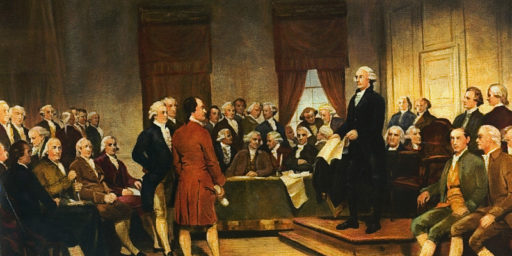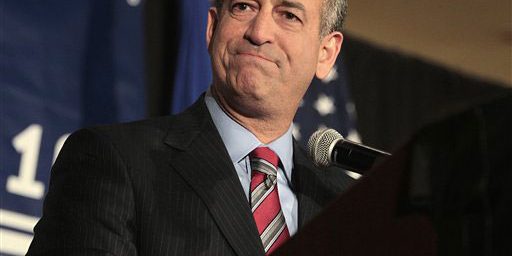Senate Approves Patriot Act Renewal, 89-10
The Senate voted 89-10 to renew the Patriot Act, after making essentially cosmetic concessions to end a filibuster led by Democrat Russ Feingold.
The Senate voted overwhelmingly today to extend the Patriot Act, clearing the way for the House to wrap up its work on the anti-terrorism bill and send it to President Bush before it expires on March 10. The 89-to-10 vote was somewhat anticlimactic, since senators who back the bill had defeated a series of parliamentary delaying moves on Wednesday, but it was still good news for President Bush, who regards the measure as the legislative keystone of his anti-terrorism policies.
Indeed, President Bush issued a statement half a world away, in New Delhi, before the Senate voted but when it was obvious that the bill’s detractors had run out of tactics. “I applaud the Senate for voting to renew the Patriot Act and overcoming the partisan attempts to block its passage,” the president said. “The terrorists have not lost the will or the ability to attack us. The Patriot Act is vital to the war on terror and defending our citizens against a ruthless enemy. This bill will allow our law enforcement officials to continue to use the same tools against terrorists that are already used against drug dealers and other criminals, while safeguarding the civil liberties of the American people.”
But reaction to today’s vote signaled that the Patriot Act will continue to be debated in the United States long after Congress has approved it. The senators opposing the bill, all Democrats except for the independent James Jeffords of Vermont, argued that the civil rights protections written into the measure were too modest. “Americans want to defeat terrorism and they want the basic character of this country to survive and prosper,” said Senator Russell D. Feingold of Wisconsin, who was the only senator to vote against the original bill when it was passed shortly after the attacks of Sept. 11, 2001. “They want both security and liberty, and unless we give them both — and we can if we try — we have failed.”
The bill, which extends 16 provisions of the USA Patriot Act (14 permanently and two through 2009), now goes to the House, which will act on it next week. That chamber has already approved the general measure, but it will vote again to accommodate the late changes put in by the Senate.
Since a sizable majority of House members have already voted for the Patriot Act � and since the House procedures do not include a filibuster, under which a minority of lawmakers can stall legislation � House approval of the Senate’s final version is certain, barring an extraordinary shift in sentiment in the days just ahead.
The irony is that most of the civil liberties objections people have about post-9/11 enforcement measures are not in the Patriot Act–and that the Act itself has probably not done much to stop terrorists. Politically, though, this and the nuclear accord reached with India today are some much needed good news for a president who has been reeling from one bad story after another.






The interesting thing was hearing Harry Reid, who a short time ago was bragging about killing the Patriot Act, taking credit for a bipartisan effort to renew the Act yesterday.